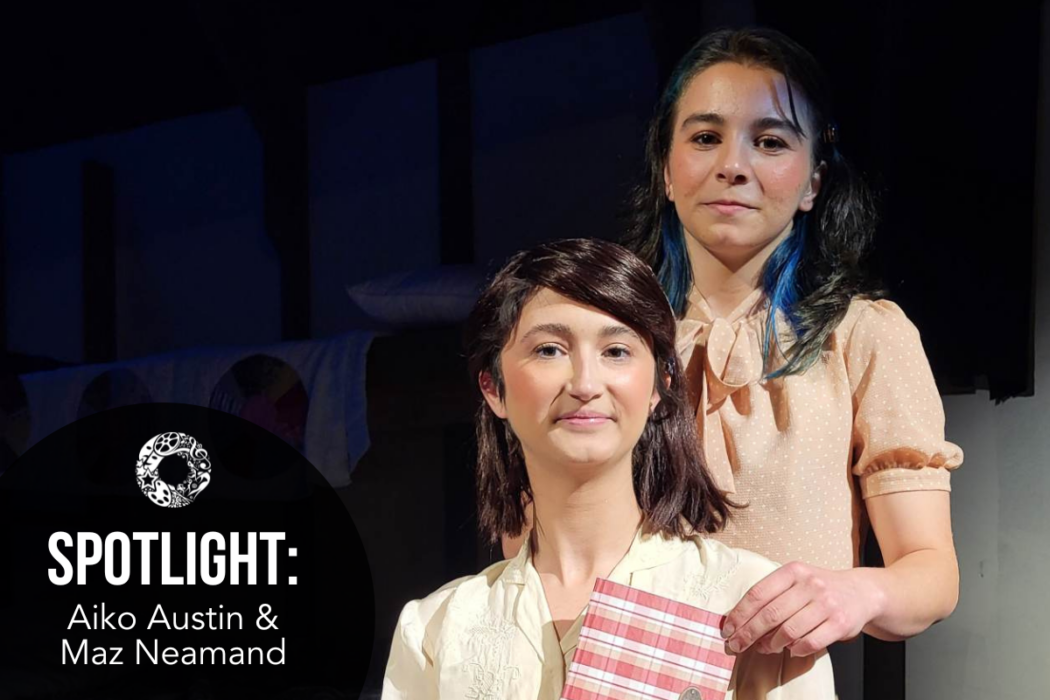by Christy Rodriguez de Conte Maz Neamand and Aiko Austin strive to portray the two sides of Anne Frank through her inspirational words while reflecting on the truths of history in Monticello Opera House’s production of "The…
By Tallahassee Arts Guide
by Christy Rodriguez de Conte
Maz Neamand and Aiko Austin strive to portray the two sides of Anne Frank through her inspirational words while reflecting on the truths of history in Monticello Opera House’s production of “The Diary of Anne Frank,” opening April 21.
In a world where ammunition and greed reign supreme, and persecution based on race, sexual identity, and religious beliefs actively threatens to be codified into law, how do we put the adage “never forget” into practice? Though denied by some, horrific events like the Holocaust are recognized as moments when the world united to overcome evil.
Museums across the nation project numbers like 6 million side by side overflowing piles of shoes and empty suitcases to highlight the sheer magnitude of atrocities committed by the Nazis against Jews, Poles, Czechs and others. The Monticello Opera House proposes that we can practice the act of respectful remembrance by narrowing the scope from the global to the personal and presenting it on a stage for anyone to see.
The play adaptation of “The Diary of Anne Frank,” Frank’s posthumously published journal, welcomes audiences into her father’s former office in Amsterdam while hiding from the Nazis in World War II. The intimate portrayal of this family’s struggle to survive from a young teenage girl’s eyes has inspired and challenged the two actors charged with speaking Anne Frank’s words, Maz Neamand and Aiko Austin.
Neamand, a disabled lesbian, feels that her existence is a subject of political debate in courthouses and that queer people are mistreated and hated like Jews were and continue to be. Thus she eloquently expounds on the question, ‘Why this play, now?’
“(Today’s teenagers) are witnessing such a complicated political climate right now,” Neamand said. “And they really need to be brought up with the awareness of what really happened to the Franks during the Holocaust. What was the book for? What happened during the Holocaust? Not just (the loss of) millions and millions of lives, but what led to that point? What it was like to live through such horrors so that together we can all prevent it from ever happening again.”
In our post-COVID theater reality, understudies have saved Broadway and community theaters. Double casting is more common than in years past. Although it may translate to more rehearsals and discussions, it also provides a more in-depth, three-dimensional understanding and portrayal of the character.
“We have two sides of the same coin of Anne,” says Austin. “I’m closer to the age of Anne right now… Maz is double that. You can see that within our acting. I believe my acting is more the childish version of Anne, but when you watch Maz act, the more mature side of Anne comes through.”
Both actors have been performing in the Tallahassee theater scene since they were young and made their way through the halls of Tallahassee Community College. Proud to bring this story to the stage of the Monticello Opera House, they each approach the character in different ways.
Neamand finds herself drawn to Anne Frank’s problem-child persona and the feeling of being ostracized for living one’s truth. Led by research, she relies on the 20-page research document she compiled that includes history, ethnographic accounts, and quotes from Frank herself.
Austin admits she leads more with her heart and envies Anne Frank’s ability to discover and share her passion and zest for life. Neamand and Austin have fallen in love with the power of her words. “Home girl was wordy,” laughs Neamand. Yet she and Austin agree that the research, combined with the power behind spoken words, creates a moment of transcendence on stage.
Neamand said, “It is as if the weight of all that knowledge is possessing me. She’s (Anne) standing next to me, holding my hand, egging me on to tell the whole world her story. The heart drives the performance, and the knowledge informs the heart.”
Documentary theater holds a special place on the stage. It serves as a bridge between journalism, art, history, and the future. If we are destined to repeat history, theater is there to take note and redirect. Neamand would like to make it known, in all caps, that “THIS WAS REAL!” Anne Frank wrote feverishly to document the active extermination of the Jewish people in Europe. This play brings us eye to eye with hard truths revealed by our past.
The Monticello Opera House’s production of “The Diary of Anne Frank” will open its doors on April 21 to Tallahassee and surrounding communities for audiences to reflect through performance about freedom, family, nation, and God. Through her process, Austin has found unexpected moments that provide comfort in the chaos.
“In the play, we only have two people who support us. But in the real-life story of the Franks, I want to say there are at least five main people. Then, there is a whole army of people behind [those five] to help support them,” says Austin. “There will be people underneath you that feel the same as you, have the same vision, and are willing to help you.”
If we can take nothing from the tragedies of war and the inhumanities of history, it is the hope that there are people underneath willing to help fight for freedom from persecution for all.
Learn more about the Monticello Opera House’s production of “The Diary of Anne Frank”
Read more on the Tallahassee Democrat.

